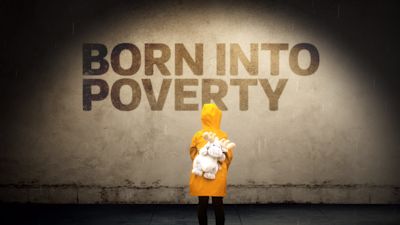Child Poverty: Lancashire baby bank sees demand quadruple due to Covid pandemic

Report by Granada Reports presenter Gamal Fahnbulleh
A baby bank says it has seen demand for help quadruple due to the pandemic.
The TippyToes Baby Bank in Lancashire provides nappies, baby formula, prams and clothes to parents who cannot afford to pay for them themselves.
They say since the pandemic they are seeing more and more newborns born into poverty.
Alongside the financial implications, data also shows living in a deprived area means you are significantly more likely to experience stillbirth or newborn death.
Melanie Brown was reliant on benefits before the pandemic struck, she says things have cost more due to coronavirus.
She says: "Bills have become more expensive during lockdown because you're always at home and you've always got your heating on, and the kids just always want to eat.
"Yeah we've not been paying for days out and stuff like that, but we couldn't have afforded that anyway, so it has been more expensive.
"Just things like, if you need a pair of shoes, there's no money for that. There's money for the basics but there's nothing for the things that suddenly crop up."
Figures show babies born into poverty are more likely to die in infancy - the North West has the second highest infant mortality rate in the country. Women living in the most deprived areas are also at a significantly higher risk of stillbirth or newborn death compared to those who live in the most affluent areas.
Doctors like Rakhee Shah, from the Royal College of Paediatrics, say the inequality is chronic.
The picture of poverty is something often associated with developing countries.
Dr Shah adds: "When you're on the front line and when you're at the food banks, and you see the realities of it, it's very shocking.
"Babies are more likely to die under the age of one due to sudden unexpected death, it can affect your social and cognitive and emotional development and therefore affect how ready you are for school later on."
The Snowdrop Doula in Accrington offers second hand clothes and goods at its baby bank. Staff like Jennifer Fielding are worried as they see more and more coming through their doors for help. Jennifer adds: "Infant poverty is not something that you think about in terms of the whole generic child poverty.
"We know there's a lot of children living in situations that are very difficult, but infant poverty is babies going hungry, it's stuff you see on the news in other countries."
The number of parents struggling to provide their children with bare essentials - including nappies, cots and winter clothing - has soared during the pandemic.
Food banks and baby banks have become a norm.
Data shows it is those who can least afford it are being hit the hardest by Covid-19, with the most vulnerable suffering the most.
The Kindfulness Coffee Club in Bootle say it has never been busier - with people from all backgrounds coming through its doors.
Mandy Lewtas says: "Through the first lockdown we were mainly supplying nappies, a few Moses baskets, since the middle of December it's gone off the scale.
"So we've done four this morning already, varying things from sterilisers, formula milk, nappies and Moses baskets full of goodies - we try and do as a nice present.
"People are proud, people shouldn't have to be in this position in this day and age."
The Government says it has "consistently supported the lowest-paid families".
In a statement it said: "We know this has been a challenging time for many and we have consistently supported the lowest-paid families, including by raising the living wage, protecting 9 million jobs with furlough and boosting welfare support by £9.3 billion. "In addition Healthy Start payments are set to increase from £3.10 to £4.25 a week from April 2021, helping pregnant women and young children from lower income families to access fruit, vegetables, milk and vitamins to support a healthy lifestyle. And this builds on our Covid Winter Grant Scheme, helping keep children warm and well fed."
Gamal Fahnbulleh spoke to Gill Adgie, from the Royal College of Midwives, and began by asking if she thinks infant poverty is getting worse.
READ MORE: